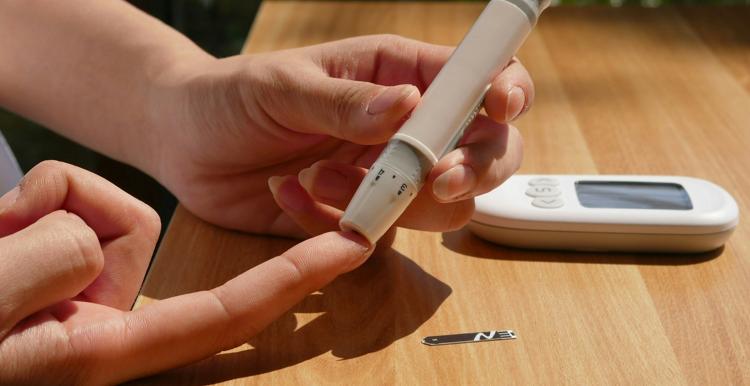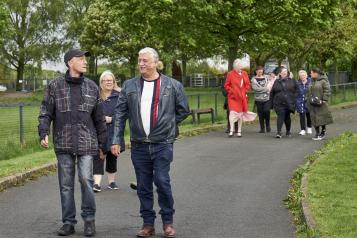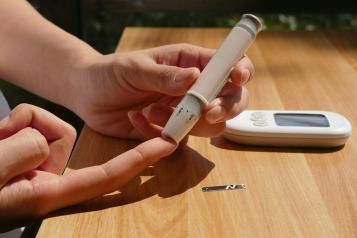Good awareness of Type 2 Diabetes across Hertfordshire

The Hertfordshire and West Essex Integrated Care Board (ICB) Primary Care Board asked Healthwatch Hertfordshire to research knowledge and awareness of Type 2 Diabetes amongst Hertfordshire Residents.
Type 2 Diabetes develops when the body stops producing enough insulin, or the body’s cells stop reacting to insulin produced. The onset of Type 2 Diabetes can be delayed or prevented through changing behaviour and lifestyle choices.
The Hertfordshire and West Essex ICB has listed the management and prevention of Type 2 Diabetes as key priorities in the Hertfordshire and West Essex Joint Forward Plan 2023-28.
How did we do this research?
We ran an online survey to hear from Hertfordshire residents over the age of 18 – whether or not they had a diagnosis of Type 2 Diabetes.
Of the respondents, 40% had a diagnosis of Type 2 Diabetes and 60% had not been diagnosed. Half of those without a diagnosis had been told by a medical professional they were at risk of developing Type 2 Diabetes.
Between August and October 2023, 216 Hertfordshire residents completed our survey which aimed to find out about:
- Public awareness and understanding of Type 2 Diabetes and how this could be improved.
- How people who have been diagnosed with pre-diabetes are supported by primary care services.
- How people with a diagnosis of Type 2 Diabetes are supported by primary care services to self-manage their condition.
What did people tell us?
People with Type 2 Diabetes were generally positive in their responses, with most having had an Annual Diabetes Review and were comfortable self-managing their condition. For those at high risk of developing Type 2 Diabetes, 58% felt supported in ways to prevent the condition but only 55% had been referred to the NHS Diabetes Prevention Programme.
Other findings included:
Testing for Type 2 Diabetes
- People told us there should be more testing for Type 2 Diabetes in healthcare and community settings.
- Healthcare settings should make every contact count and use routine interactions to ask about overall health and risk of Type 2 Diabetes.
- Most people, whether they had Type 2 Diabetes or not, said they would like regular health check-ups including the reviews and examinations they were entitled to.
Diagnosis
- More than half of those diagnosed said their condition was not clearly explained to them when they received the diagnosis, or not explained to them at all. They were put on medication with little support or information about other ways to manage the condition such as diet, exercise and lifestyle changes.
- Some had to wait several months before being referred to a course and/or to speak with a healthcare professional about their diagnosis.
About health complications
Respondents were asked about awareness of health complications associated with Type 2 Diabetes. Although there was generally good awareness of eye damage (retinopathy) and nerve damage (neuropathy), awareness of other conditions such as kidney disease and stroke was low.
Some people were unable to list any complications, highlighting a lack of awareness and understanding about information which they should have been given at diagnosis.
About managing their condition
Most respondents (77%) felt comfortable and confident managing their condition, although 59% said they still face challenges. Common challenges included:
- Trying to lose weight and eat healthily
- Regulating and reducing blood glucose levels to within the correct range. Many said they didn’t feel supported by clinicians to manage this.
- Medication - particularly managing insulin intake.
Regular health checks
NHS Health Check - 64% of respondents over the age of 40 had not received a free NHS Health Check. Many had not even been invited by their GP practice and didn’t know they were entitled.
Healthier You | Diabetes Prevention Programme (preventing-diabetes.co.uk) - 45% of respondents at risk of developing Type 2 Diabetes had not been referred to the programme.
DESMOND Programme (for those diagnosed with Type 2 Diabetes) - respondents found it informative, helpful and provided them with a better understanding of the condition and how it could be managed.
Annual Diabetes Review - Positively, 94% of respondents said they had been offered an Annual Diabetes Review.
What happens now?
Based on our findings, we have recommended that local NHS:
- Investigate inequalities in awareness, diagnosis and management amongst different demographic groups. Consider targeted interventions and engagement with particular demographic groups including men, ethnically diverse communities, those with less disposable income and those aged under 55.
- Increase awareness of the risk factors, symptoms and long-term complications associated with Type 2 Diabetes.
- Promote NHS Health Checks and ensure eligible patients are invited. Refer people at high risk of developing Type 2 Diabetes to the NHS Diabetes Prevention Programme.
- Clinicians to thoroughly explain Type 2 Diabetes and how the condition can be self-managed when giving people a diagnosis.
- Ensure people with Type 2 Diabetes are routinely monitored and given sufficient information and support to self-manage their condition, with a particular focus on lowering blood glucose levels and information about healthy eating.
- Promote and refer people with Type 2 Diabetes to the DESMOND Programme and other available courses.
- Ensure all nine care processes are carried out at Annual Diabetes Reviews, with enough time to discuss any issues and concerns including mental health and wellbeing.
- Provide information about healthy eating, nutrition, exercise and weight management in a range of accessible formats and in a range of healthcare and community settings.
- Consider the use of social prescribers for people with, or at high risk of developing, Type 2 Diabetes.
“We would like to thank everyone who took the time to fill in this survey and let us know their awareness and understanding of Type 2 Diabetes. One of our priorities as an ICB is to increase the number of residents taking steps to improve their wellbeing and understanding diabetes and how to prevent it is key. We want to prevent people developing Type 2 Diabetes, support residents to manage their condition or even potentially go into remission for the disease.
“The Healthier You NHS Diabetes Prevention Programme (NDPP), also known as the Healthier You programme, helps people who have been told by their GP, nurse or another healthcare professional that they are at risk of developing type 2 diabetes. We encourage GPs and other healthcare professionals to refer into this programme to health residents with their diet, managing stress and moving more as well as monitoring their weight.
“We also support a range of education programmes for people who are newly diagnosed and people who are living with diabetes to help manage their condition. We encourage patients who are diagnosed to attend as many of these as possible. There is a Herts and West Essex Diabetes Support Group which runs a programme of free educational webinars open to anyone living in Hertfordshire and west Essex who has diabetes, or at risk of developing diabetes along with families and carers.
“We have recently launched the Type 2 diabetes path to remission programme which is a free programme designed to help people reduce their diabetes medications, lose weight, improve their health, and potentially put type 2 diabetes into remission.
“Reaching people more at risk of diabetes is key which is why we worked on a series of six short videos produced and presented by Hertfordshire-based lifestyle coach Monir Ali, who was diagnosed with type 2 diabetes in 2016. The videos aim to inspire people to turn their type 2 diabetes around.
“More local programmes to support a reduction in people getting diabetes as well as support those with the illness are in development and all go towards our plans for creating a healthier future for our residents.
“We will continue to work with Healthwatch Hertfordshire to get continuous feedback to improve the outcomes for our residents with type 2 diabetes.”
Downloads
Read the full Report here.


